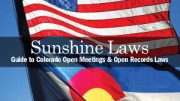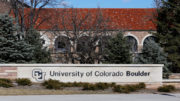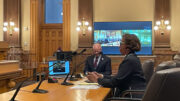By Jeffrey A. Roberts
CFOIC Executive Director
A Pagosa Springs lawyer who routinely sues school boards around the state for violations of the open meetings law is defending his role as a “private attorney general” in a case now before Colorado’s second-highest court.
A district court judge in Elbert County recently found that attorney Matt Roane, as a citizen of Colorado, “has a legally protected interest in having public bodies conduct public business openly in conformity with the provisions in the statute.” She denied a motion by the Elizabeth School District to dismiss a Roane lawsuit based on the argument that he “has no connection to the Town of Elizabeth.”

Now the question of Roane’s legal standing to file suit against a public body in a jurisdiction where he doesn’t reside is in the Court of Appeals, which agreed in December to let the school district immediately appeal the district court ruling. The Colorado Association of School Boards and the Colorado Rural Schools Alliance quickly submitted a friend-of-the court brief.
“For the past several years, Mr. Roane has personally profited from the mistakes of (mostly) rural school boards,” their brief says. While the organizations “do not question his integrity or his motivation,’ it adds, they “strongly oppose his actions because they are inconsistent with the purpose of the Open Meetings Law and have diverted critical funds away from kids and classrooms around the state.”
As both attorney and plaintiff, Roane has filed at least 55 lawsuits against Colorado school districts since 2020, alleging violations of the Colorado Open Meetings Law, “and has threatened to file suit against countless others,” according to the school associations’ amicus brief. The Colorado Freedom of Information Coalition counted a total of 93 pro se lawsuits filed by Roane against local governments. Roane told CFOIC the number is 96.
“He searches the websites of school districts and other local public bodies looking for possible violations of the (the law) by reviewing their board agendas and meeting minutes,” says the Elizabeth School District’s petition to the Court of Appeals. “If he finds a potential violation, he sues the offending entity pro se,” often settling for $3,250.
Roane’s law practice prompted state lawmakers last year to introduce a bill that would have let local public bodies “cure” an inadequately announced closed-door meeting at a subsequent meeting, and anyone who unsuccessfully challenged an executive session announcement in court would have been liable for the government’s court costs and attorney fees. CFOIC eventually persuaded legislators to limit the scope of the bill, which Gov. Jared Polis later vetoed.
Roane hasn’t yet filed his own brief in the Court of Appeals, but he defended his open government-focused legal challenges in district court documents, noting that the General Assembly “has not seen fit to create any public body with the authority to enforce” the open meetings law.
“There are no administrative actions. There are no criminal penalties. Instead, the state thrusts enforcement of (the law) solely upon the shoulders of private citizens who are willing to engage in civil litigation,” Roane wrote.
He cited Colorado case law referring to such citizen-litigants as “private attorneys general, who, through the exercise of their public spirit and private resources, cause[] a public body to comply with the Open Meetings Law.”
Several years ago, Roane “became frustrated with the numerous violations of COML he witnessed, so he adjusted his law practice to address the problem,” he wrote about himself. “With the advantages of his dual roles as an attorney and a Colorado citizen, Mr. Roane now routinely sues public bodies that violate the statute, and he does so with a consistency and frequency that cause public bodies to pay attention and change their behavior. The likelihood of civil litigation is now a very real possibility for any public body that violates COML.”
“As one might expect, public bodies hate (his) practice and show remarkably little restraint expressing it,” Roane added. “But the General Assembly relies upon citizens to enforce COML, and that is all (he) is trying to do. His practice is the only solution he has come up with, to date, that puts teeth into the role of the ‘private attorney general.’“
In the Elizabeth school district case, Roane is challenging the legality of a school board executive session held Apr. 10, 2023, contending the board failed to publicly announce the “particular matter” it intended to discuss behind closed doors, as the law requires. “The Board’s violation of COML prevented Mr. Roane from witnessing the Board conduct public business openly in conformity with the statute,” his complaint alleges.
When the board pushed back, petitioning the Court of Appeals to take up the matter, it accused Roane of “taking advantage of small rural communities and school districts for alleged violations that have not impacted him at all.”
“Roane does not live in Elizabeth; Roane has no children in the Elizabeth schools; Roane has no client in Elizabeth; Roane does not pay taxes in Elizabeth; and it would be unsurprising if Roane has never set foot in Elizabeth at all,” wrote attorney Bryce Carlson for the school district. (Roane actually does represent an Elizabeth resident in a separate lawsuit against the school board.)
The school district and the school associations argue that Roane has no legal standing to sue the Elizabeth school board because he hasn’t shown that he “suffered an injury in fact.”
“Mr. Roane claims an injury-in-fact based on a ‘lack of knowledge’ as to the purpose of the Elizabeth School Board’s executive session, but Mr. Roane is not genuinely interested in the information,” says the associations’ amicus brief. “Instead, his primary concern is in ensuring compliance with the Open Meetings Law. Although this may be an admirable goal … it is not sufficient grounds for standing under the Colorado law.”
In her Oct. 18 district court ruling in Roane’s favor, Judge Theresa Slade pointed to language in the open meetings law, added in 2014, that “[a]ny person denied or threatened with denial of any of the rights that are conferred on the public by (the statute) has suffered an injury in fact and, therefore, has standing to challenge the violation.” She also noted a 2015 Court of Appeals holding that the open meetings law “creates a legally protected interest on behalf of Colorado citizens in having public bodies conduct public business openly in conformity with its provisions.”
The school district, however, contends the judge’s order concerns “an unresolved question of law.”
“The Colorado Supreme Court has not addressed whether C.R.S. § 24-6-402(9) permits any person to invoke the power of the judicial branch to challenge any alleged violation of the OML regardless of whether the person has any connection to the local jurisdiction and regardless of whether the person has suffered any cognizable harm because of the alleged violation,” its petition says.
Roane told CFOIC he believes the case could “reshape” the open meetings law if the Court of Appeals reverses Slade’s ruling.
“What would it mean for journalists who do not live in the local jurisdiction but simply need compliance to do their job from afar, just like the same compliance I need to do mine from afar?” he wrote in an email. “If the Court reverses, I do not trust that the new generation of legislators shares the same respect for openness as earlier generations which would be needed to correct course. Troubling times from my perspective.”
Follow the Colorado Freedom of Information Coalition on Twitter @CoFOIC. Like CFOIC’s Facebook page. Do you appreciate the information and resources provided by CFOIC? Please consider making a tax-deductible donation.




